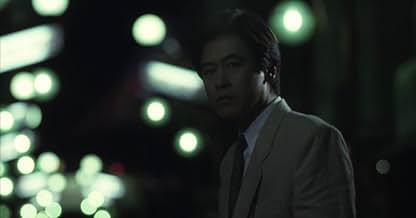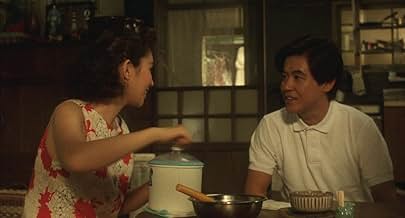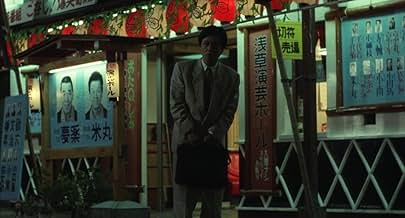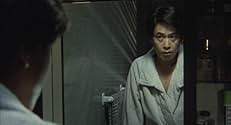Ajouter une intrigue dans votre langueA recently divorced writer is reunited with the ghosts of his parents who died when he was a boy. However, every time he sees them he loses more life energy. Now, he must choose between star... Tout lireA recently divorced writer is reunited with the ghosts of his parents who died when he was a boy. However, every time he sees them he loses more life energy. Now, he must choose between starting a new life or staying forever in the past.A recently divorced writer is reunited with the ghosts of his parents who died when he was a boy. However, every time he sees them he loses more life energy. Now, he must choose between starting a new life or staying forever in the past.
- Réalisation
- Scénario
- Casting principal
- Récompenses
- 13 victoires et 11 nominations au total
Bengal
- Taxi Driver
- (as Bengaru)
Avis à la une
Although 'discarnate' was a new word to me, I see it is defined in the dictionary as, 'disembodied', so although seeming a little clumsy as a film title, not totally inaccurate, although they probably should have stuck to the singular. I read 'Strangers' by Taichi Yamada, earlier this year and pondered how difficult it might be to film, not aware that it had indeed already been so filmed twenty years ago. The splendidly spooky book (Ijin-tachi to no Natsu, in the Japanese) was originally published in Japan in 1987 but only translated into English recently. The film itself is very faithful to the book and overcomes the difficulties I foresaw fairly creatively but mainly with the use of shadow. The middle section of the film seems a little flat, whereas in the book we are in the midst of deeply disturbing images both of the main character's deterioration and his friend's 'scars', the film plays this in a more straightforward manner. Nevertheless the film is well paced, has a warmth as well as worry to it and nobody could be disappointed by the rousing ending. A difficult book to adapt, but done surprisingly well.
A lovely film. The performances by the high-quality cast are excellent and convincing. Kazama does a great job as the scenario writer who gets a second chance to spend time with his loving parents, who actually were killed when he was twelve. Yuko Natori is wonderful and sexy as his amorous neighbour who becomes his lover and confidante. Woven into the story is a lovely moral tale about a man who is a total failure as a person (though with a successful career) getting back in touch with his true feelings. Highly recommended.
Natsu up there in the original title = summer, while ijin probably means foreigner in the sense not at all of Westerner, but rather of outsider. Depending on the kanji, there might be a hint also, though it would have to be sarcastic and I'm not sure exactly who about, of mastermind, great man. I'm thinking of Harada's parents or himself as the target, but don't know whether that kind of pun/allusion goes in the language. I sincerely hope ijin isn't used for "zombies" as in the secondary English title here, but even if it is, there must be at least hints of other meanings.
So, here's a film nearly as awkward as the unfortunate English translations of its title. It has three supremely interesting characters, none of them the bland protagonist.
Yuko Natori's Kei, Harada's only nighttime neighbor in a large building of mostly offices, bursts through his door one night, clearly vulnerable, alone, feeling the emptiness of the building, perhaps suffering from drink but clearly damaged somehow beyond that. Though barely a sketch, and a bit older, she suggests the legion of slightly off young women who hound Haruki Murakami's protagonists. When dull Harada gently slams the door in her face, viewers can't help but feel a loss. Later of course, there's the quirk about her front: no face to face love-making. The mystery wrought by her ever-present clothing, in combination with her aggressiveness, creates a fine-toned sensuality.
Hardly less sensual is Fusako, Harada's mother. Introduced after Kei, perhaps as lonely as Kei but in a different sense, roughly the same age as Harada and Kei, her aggressive doting on her son startles at first. She seems a counterpoint, a reflection, even a rival of Kei. I think early on, sweltering in the heat of the title's summertime, she was wearing just a slip. At one point she climbs onto Harada's back to reach a high shelf and falls into his arms. This moment takes a brief eternity to pass.
The third finely turned character is Harada's father, Hidekichi. Somehow -- and no doubt the lighting, ambient sound, and cramped yet expansive bustling street set help -- he embodies an innocence that the film's creators have chosen to give to his times. Bare-armed, swaggering, lethargically energetic, oozing a hospitality that's actually quite cunning but appears naive, he could be any child's workingman father or any "Postman Rings Twice" film's husband. Even though there's little or nothing of the cliché cuckold plot here, without him the two fleetingly sublime women characters wouldn't resonate as they do.
So, here's a film nearly as awkward as the unfortunate English translations of its title. It has three supremely interesting characters, none of them the bland protagonist.
Yuko Natori's Kei, Harada's only nighttime neighbor in a large building of mostly offices, bursts through his door one night, clearly vulnerable, alone, feeling the emptiness of the building, perhaps suffering from drink but clearly damaged somehow beyond that. Though barely a sketch, and a bit older, she suggests the legion of slightly off young women who hound Haruki Murakami's protagonists. When dull Harada gently slams the door in her face, viewers can't help but feel a loss. Later of course, there's the quirk about her front: no face to face love-making. The mystery wrought by her ever-present clothing, in combination with her aggressiveness, creates a fine-toned sensuality.
Hardly less sensual is Fusako, Harada's mother. Introduced after Kei, perhaps as lonely as Kei but in a different sense, roughly the same age as Harada and Kei, her aggressive doting on her son startles at first. She seems a counterpoint, a reflection, even a rival of Kei. I think early on, sweltering in the heat of the title's summertime, she was wearing just a slip. At one point she climbs onto Harada's back to reach a high shelf and falls into his arms. This moment takes a brief eternity to pass.
The third finely turned character is Harada's father, Hidekichi. Somehow -- and no doubt the lighting, ambient sound, and cramped yet expansive bustling street set help -- he embodies an innocence that the film's creators have chosen to give to his times. Bare-armed, swaggering, lethargically energetic, oozing a hospitality that's actually quite cunning but appears naive, he could be any child's workingman father or any "Postman Rings Twice" film's husband. Even though there's little or nothing of the cliché cuckold plot here, without him the two fleetingly sublime women characters wouldn't resonate as they do.
Recently divorced "Hidemi Harada" (Morio Kazama) has only now begun to realize how utterly selfish he has been and is regretting the fact that he has been such a bad husband and father. With that in mind he decides to revisit the small hometown where he grew up to perhaps relive a part of his life. However, upon doing this he happens to see a man that resembles his deceased father. More incredibly the man invites him to his house and introduces him to a woman who resembles his deceased mother. To his further shock he learns that they are indeed his deceased parents and act like nothing has changed since he last saw them before their fatal accident over 28 years ago. But that's not all! However, rather than reveal any more of this movie and risk spoiling it for those who haven't seen it I will just say that this was an interesting Japanese horror film which is light on action but deep in meaning. I especially liked the performances of Kumiko Akiyoshi (as Hidemi's mother "Fusaka Harada") and Yuko Natori ("Kei") who both played their parts quite well. In any case, if a person is looking for plenty of gore or action they won't find it here but even so it's still an interesting movie which I enjoyed and I have rated it accordingly. Above average.
This is probably the most subdued Nobuhiko Obayashi film I've seen so far (granted, we're only talking about six or seven movies), and it only has occasional stylistic flourishes that are reminiscent of his wilder/crazier films. I kind of liked him dialing it back for this story; the approach worked very well, though one nitpick might be some of the scene transitions where the image paused and awkwardly shrunk looked a little cheesy.
It was great to watch this fairly soon after seeing and loving All of Us Strangers, with both adapting the same source material in different ways. The premise and main four characters carry over in both, but there are enough interesting differences to make The Discarnates worth watching for anyone who liked All of Us Strangers, and vice versa.
The more recent adaptation of Taichi Yamada's novel Strangers probably affected me more emotionally, but I still found The Discarnates moving in parts and overall engaging, both for the familiar and unfamiliar beats contained within. It's very good, and I hope it gets a little more well-known in the wake of this newer adaptation (I didn't even realize the story of All of Us Strangers had already been made into a film, and maybe others are in the same boat).
It was great to watch this fairly soon after seeing and loving All of Us Strangers, with both adapting the same source material in different ways. The premise and main four characters carry over in both, but there are enough interesting differences to make The Discarnates worth watching for anyone who liked All of Us Strangers, and vice versa.
The more recent adaptation of Taichi Yamada's novel Strangers probably affected me more emotionally, but I still found The Discarnates moving in parts and overall engaging, both for the familiar and unfamiliar beats contained within. It's very good, and I hope it gets a little more well-known in the wake of this newer adaptation (I didn't even realize the story of All of Us Strangers had already been made into a film, and maybe others are in the same boat).
Le saviez-vous
- AnecdotesRemade as All of Us Strangers
- ConnexionsFeatures Carmen revient au pays (1951)
- Bandes originalesO mio babbino caro
by Giacomo Puccini
Meilleurs choix
Connectez-vous pour évaluer et suivre la liste de favoris afin de recevoir des recommandations personnalisées
- How long is The Discarnates?Alimenté par Alexa
Détails
Contribuer à cette page
Suggérer une modification ou ajouter du contenu manquant

Lacune principale
By what name was Ijin-tachi to no natsu (1988) officially released in India in English?
Répondre
















